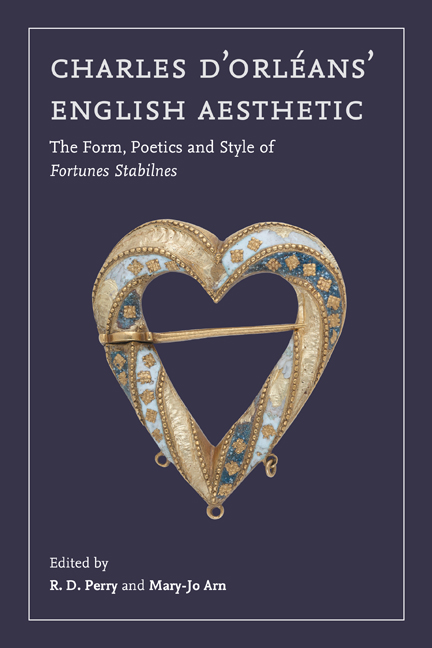Book contents
- Frontmatter
- Dedication
- Contents
- List of Illustrations
- List of Contributors
- Acknowledgements
- Abbreviations
- Introduction
- 1 The Two Dreams of Charles d’Orléans and the Structure of His English Book
- 2 Charles d’Orléans’ Cross-Channel Poetics: The Choice of Ballade Form in Fortunes Stabilnes
- 3 The English Roundel, Charles’s Jubilee, and Mimetic Form
- 4 A Grieving Lover: The Work of Mourning in Charles’s First Ballade Sequence
- 5 Charles d’Orléans’ English Metrical Phonology
- 6 The English Poetry of a Frenchman: Stress and Idiomaticity in Charles d’Orléans
- 7 Verb Use in Charles d’Orléans’ English
- 8 Charles d’Orléans and His Finding of English
- 9 Aureation as Agon: Charles d'Orléans versus John Lydgate
- 10 Charles d’Orléans, Harley 682, and the London Book-Trade
- 11 The Form of the Whole
- Select Publications, 2007–2020
- Index
10 - Charles d’Orléans, Harley 682, and the London Book-Trade
Published online by Cambridge University Press: 14 October 2020
- Frontmatter
- Dedication
- Contents
- List of Illustrations
- List of Contributors
- Acknowledgements
- Abbreviations
- Introduction
- 1 The Two Dreams of Charles d’Orléans and the Structure of His English Book
- 2 Charles d’Orléans’ Cross-Channel Poetics: The Choice of Ballade Form in Fortunes Stabilnes
- 3 The English Roundel, Charles’s Jubilee, and Mimetic Form
- 4 A Grieving Lover: The Work of Mourning in Charles’s First Ballade Sequence
- 5 Charles d’Orléans’ English Metrical Phonology
- 6 The English Poetry of a Frenchman: Stress and Idiomaticity in Charles d’Orléans
- 7 Verb Use in Charles d’Orléans’ English
- 8 Charles d’Orléans and His Finding of English
- 9 Aureation as Agon: Charles d'Orléans versus John Lydgate
- 10 Charles d’Orléans, Harley 682, and the London Book-Trade
- 11 The Form of the Whole
- Select Publications, 2007–2020
- Index
Summary
Much critical discussion of the collection of poems that survives as London, British Library MS Harley 682 (H), has focused on the question of its authorship. In the early twentieth century the authorship debate was taken up by Henry Noble MacCracken, who attributed the poems to William de la Pole, duke of Suffolk. The case for Charles’s authorship was convincingly argued by the editors of the EETS edition. Along with various kinds of linguistic evidence in favour of the duke's authorship, Robert Steele drew attention to the importance of the relationship between H and the duke's autograph collection of his French poetry, now Paris, Bibliothèque nationale de France MS fr. 25458 (O): ‘The close connexion between Charles's personal manuscript (which never went out of his possession) and the relative portions of Harl. 682 is of prime importance in determining the authorship of these latter poems.’ Building upon this suggestion, Mary-Jo Arn's detailed comparison of the two codices led her to conclude that the format and layout of H was deliberately modelled upon the features of O. These similarities suggest that a single individual was responsible for overseeing the production of both books, and therefore also the production of the texts themselves: ‘In short, H is more like O in significant details than it is like other manuscripts of courtly verse written in England in the first half of the fifteenth century. This argues for one mind at work on both manuscripts – and if on both manuscripts, then by necessity on both bodies of poetry.’ In this way, the similarities between the two manuscripts came to function as important pieces of evidence in the authorship debate that occupied much scholarly assessment of the poems of H. In this chapter I will move beyond the evidence that H and its relationship to O brings to the authorship question, to consider what light these two manuscripts can shed upon the production, circulation, and ownership of copies of Charles's verse in fifteenth-century England.
I will begin my assessment of the two manuscripts with a consideration of their appearance, starting with the scripts in which the texts were copied.The main text of H was written using a mixed script of the mid-fifteenth century, combining features proper to the anglicana and secretary scripts.
- Type
- Chapter
- Information
- Charles d’Orléans' English AestheticThe Form, Poetics, and Style of Fortunes Stabilnes, pp. 245 - 264Publisher: Boydell & BrewerPrint publication year: 2020
- 1
- Cited by



